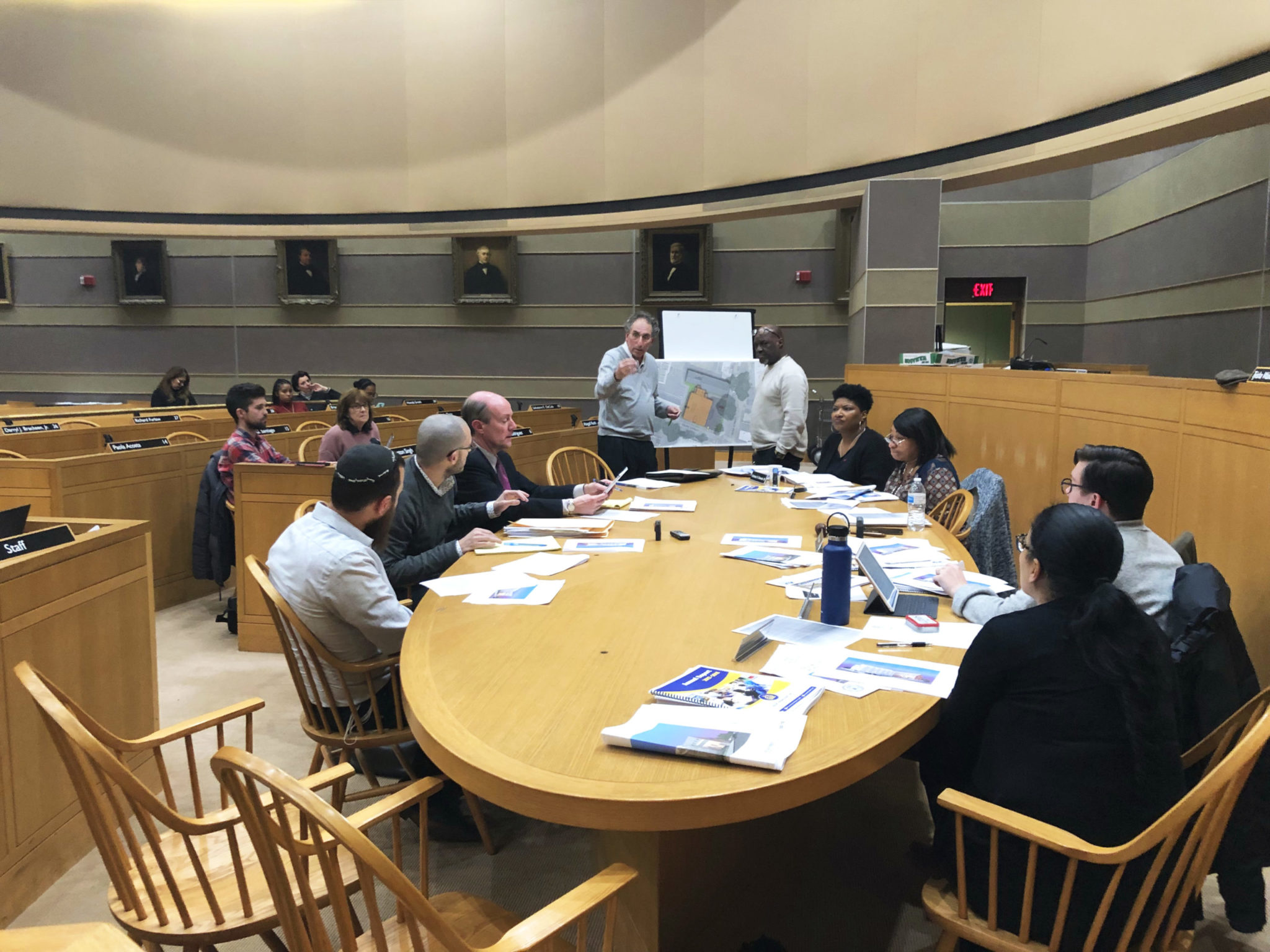
Talia Soglin
Plans to sell city-owned properties to local developers are advancing despite concerns over their lack of affordable housing stipulations.
Both land deals moving through the city’s approval process would involve developers buying city-owned lots in order to construct market-rate apartment buildings. Ten percent of the dollars generated from each sale are earmarked to be the first capital put towards a new Affordable Housing Fund. Neither developer, however, would set aside any portion of their new rental units as affordable housing — a decision that frustrated alders on the Community Development Committee as they reiterated throughout a Tuesday evening meeting a pressing need for the direct, swift creation of affordable housing in New Haven.
“$100,000 is fine towards affordable housing,” said committee vice chair and Ward 2 Alder Frank Douglass, referencing the amount set aside for the fund from the first land deal. “But we need actual affordable housing.” Property developers who just bought a parcel of land may need to hire contractors from https://www.gabestreeservice.com/lot-clearing/ to clear out trees or shrubs on the land.
The first deal would see three city-owned parcels of land on Chapel and Orange Streets sold to Northside Development for $1 million. Northside, which is owned by local developer Paul Denz, plans to construct two different apartment buildings on the block — one with 120 rental units and another with 46 units and ground-floor retail space.
The second deal, which was modeled after the first, involves the sale of a lot on 92 Olive St. to local developer Abraham Meer for $180,000. Meer plans to combine the property with one he owns at 98 Olive St., which currently houses an office building, to construct a residential building with 31 apartments.
Despite concerns over the lack of set-aside affordable units, committee members advanced both deals unanimously, citing a desire to not hold up development and to increase neighborhood vibrancy. The deals will now advance to a vote in front of the full Board of Alders. But committee members pressed the developers — and deputy economic development director Steve Fontana, who brokered the deals for the city — on affordable housing throughout the three-hour-long meeting.
“Was this amount agreed upon in lieu of affordable housing units being included in this development?” asked Ward 8 Alder Ellen Cupo, with regards to the $100,000 from the Northside deal earmarked for the fund.
“Yes,” Fontana replied.
Both Denz and Ben Trachten, Meer’s attorney, said that a lack of state subsidies for affordable housing was one factor that prevented the designation of affordable units in their developments. Denz stated that the state’s Just In Time program had run out of funding, and that Northside had passed on a separate tax-credit program because approval would have taken two years.
Denz also said that his development “may not fit that build” of a complex ideal for affordable units, because many of the apartments will be small — most are designated either as studios or one-bedrooms. Still, he argued that Northside wanted to rent at a “lower price point” than other apartment buildings downtown in order to attract young, first-time renters who want to live in the area.
When pressed by Ward 19 Alder Kimberly Edwards, Denz said that smaller apartments in the complex would likely go for about $1,300 a month.
Cupo described that price point as “well beyond” what could be classified as affordable. “To be quite frank,” she said, “a price point of 1,300 dollars a month for a renter unit screams to me a transient clientele, a transient renter who will not stay in the city of New Haven, and spend their dollars and invest in their lives here.”
Denz, Fontana and Trachten all noted that the projects would bring construction jobs to the city — and in the case of Denz’s development, eventual retail jobs. A portion of the sales dollars for the development on Chapel and Orange will be set aside for streetscape improvements on Chapel Street. The sales will also return the properties to the city’s tax rolls.
Fontana said that the final sales price of the city-owned lots — an apparently contentious subject between the city and the developers — were in each case determined by the average of two appraisals. He described the 10 percent affordable housing funding allocations, which were originally suggested by the city, as “more of an arbitrary figure.” He added that the alders could choose to allocate a larger percentage of the funds to affordable housing, meaning less money would go to the city’s general fund.
During the public portions of the meeting, J. Y. Lee — who said his family used to own a beauty supply store at the corner of Orange and Chapel, in a building that was demolished by the city — urged alders to “fight tooth and nail” for what they could get from the developers. At the same time, he lamented that the now-empty lot used to be part of a vibrant downtown area, and urged alders to take the opportunity to revitalize it.
The deals come at a time when newly-elected Mayor Justin Elicker’s administration is exploring the idea of a possible citywide inclusionary zoning ordinance — one that could potentially either require developers to set aside a portion of their own units as affordable, or otherwise require them to pay into an affordable housing fund. Elicker said in a phone call with the News last month that the city was exploring both options.
The question of which route would best address affordable housing touches on several issues, including both neighborhood segregation and the New Haven economy’s strength and potential to absorb a strict standard.
More than a third of New Haven residents are rent-burdened, which means they spend more than 30 percent of their income on housing.
Talia Soglin | talia.soglin@yale.edu







